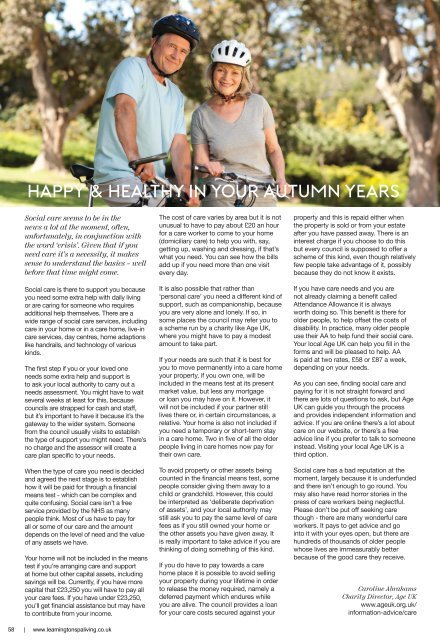Leamington and Warwick Living Mar - Apr 2020
Spring has awakened and our magazine is alive with a bountiful bouquet of features - from interviews with famous faces, delicious Easter recipes, travel to Santa Barbara, UK staycations, a bathroom and tile guide plus advice on choosing the right school.
Spring has awakened and our magazine is alive with a bountiful bouquet of features - from interviews with famous faces, delicious Easter recipes, travel to Santa Barbara, UK staycations, a bathroom and tile guide plus advice on choosing the right school.
Create successful ePaper yourself
Turn your PDF publications into a flip-book with our unique Google optimized e-Paper software.
Happy & healthy in your autumn years<br />
Social care seems to be in the<br />
news a lot at the moment, often,<br />
unfortunately, in conjunction with<br />
the word ‘crisis’. Given that if you<br />
need care it’s a necessity, it makes<br />
sense to underst<strong>and</strong> the basics – well<br />
before that time might come.<br />
Social care is there to support you because<br />
you need some extra help with daily living<br />
or are caring for someone who requires<br />
additional help themselves. There are a<br />
wide range of social care services, including<br />
care in your home or in a care home, live-in<br />
care services, day centres, home adaptions<br />
like h<strong>and</strong>rails, <strong>and</strong> technology of various<br />
kinds.<br />
The first step if you or your loved one<br />
needs some extra help <strong>and</strong> support is<br />
to ask your local authority to carry out a<br />
needs assessment. You might have to wait<br />
several weeks at least for this, because<br />
councils are strapped for cash <strong>and</strong> staff,<br />
but it’s important to have it because it’s the<br />
gateway to the wider system. Someone<br />
from the council usually visits to establish<br />
the type of support you might need. There’s<br />
no charge <strong>and</strong> the assessor will create a<br />
care plan specific to your needs.<br />
When the type of care you need is decided<br />
<strong>and</strong> agreed the next stage is to establish<br />
how it will be paid for through a financial<br />
means test - which can be complex <strong>and</strong><br />
quite confusing. Social care isn’t a free<br />
service provided by the NHS as many<br />
people think. Most of us have to pay for<br />
all or some of our care <strong>and</strong> the amount<br />
depends on the level of need <strong>and</strong> the value<br />
of any assets we have.<br />
Your home will not be included in the means<br />
test if you’re arranging care <strong>and</strong> support<br />
at home but other capital assets, including<br />
savings will be. Currently, if you have more<br />
capital that £23,250 you will have to pay all<br />
your care fees. If you have under £23,250,<br />
you’ll get financial assistance but may have<br />
to contribute from your income.<br />
58 | www.leamingtonspaliving.co.uk<br />
The cost of care varies by area but it is not<br />
unusual to have to pay about £20 an hour<br />
for a care worker to come to your home<br />
(domiciliary care) to help you with, say,<br />
getting up, washing <strong>and</strong> dressing, if that’s<br />
what you need. You can see how the bills<br />
add up if you need more than one visit<br />
every day.<br />
It is also possible that rather than<br />
‘personal care’ you need a different kind of<br />
support, such as companionship, because<br />
you are very alone <strong>and</strong> lonely. If so, in<br />
some places the council may refer you to<br />
a scheme run by a charity like Age UK,<br />
where you might have to pay a modest<br />
amount to take part.<br />
If your needs are such that it is best for<br />
you to move permanently into a care home<br />
your property, if you own one, will be<br />
included in the means test at its present<br />
market value, but less any mortgage<br />
or loan you may have on it. However, it<br />
will not be included if your partner still<br />
lives there or, in certain circumstances, a<br />
relative. Your home is also not included if<br />
you need a temporary or short-term stay<br />
in a care home. Two in five of all the older<br />
people living in care homes now pay for<br />
their own care.<br />
To avoid property or other assets being<br />
counted in the financial means test, some<br />
people consider giving them away to a<br />
child or gr<strong>and</strong>child. However, this could<br />
be interpreted as ‘deliberate deprivation<br />
of assets’, <strong>and</strong> your local authority may<br />
still ask you to pay the same level of care<br />
fees as if you still owned your home or<br />
the other assets you have given away. It<br />
is really important to take advice if you are<br />
thinking of doing something of this kind.<br />
If you do have to pay towards a care<br />
home place it is possible to avoid selling<br />
your property during your lifetime in order<br />
to release the money required, namely a<br />
deferred payment which endures while<br />
you are alive. The council provides a loan<br />
for your care costs secured against your<br />
property <strong>and</strong> this is repaid either when<br />
the property is sold or from your estate<br />
after you have passed away. There is an<br />
interest charge if you choose to do this<br />
but every council is supposed to offer a<br />
scheme of this kind, even though relatively<br />
few people take advantage of it, possibly<br />
because they do not know it exists.<br />
If you have care needs <strong>and</strong> you are<br />
not already claiming a benefit called<br />
Attendance Allowance it is always<br />
worth doing so. This benefit is there for<br />
older people, to help offset the costs of<br />
disability. In practice, many older people<br />
use their AA to help fund their social care.<br />
Your local Age UK can help you fill in the<br />
forms <strong>and</strong> will be pleased to help. AA<br />
is paid at two rates, £58 or £87 a week,<br />
depending on your needs.<br />
As you can see, finding social care <strong>and</strong><br />
paying for it is not straight forward <strong>and</strong><br />
there are lots of questions to ask, but Age<br />
UK can guide you through the process<br />
<strong>and</strong> provides independent information <strong>and</strong><br />
advice. If you are online there’s a lot about<br />
care on our website, or there’s a free<br />
advice line if you prefer to talk to someone<br />
instead. Visiting your local Age UK is a<br />
third option.<br />
Social care has a bad reputation at the<br />
moment, largely because it is underfunded<br />
<strong>and</strong> there isn’t enough to go round. You<br />
may also have read horror stories in the<br />
press of care workers being neglectful.<br />
Please don’t be put off seeking care<br />
though - there are many wonderful care<br />
workers. It pays to get advice <strong>and</strong> go<br />
into it with your eyes open, but there are<br />
hundreds of thous<strong>and</strong>s of older people<br />
whose lives are immeasurably better<br />
because of the good care they receive.<br />
Caroline Abrahams<br />
Charity Director, Age UK<br />
www.ageuk.org.uk/<br />
information-advice/care


















